|

The wise man doesn't give the right answers, he
poses the right questions. --Claude Levi-Strauss, Belgian
anthropologist
|
Astronomy
100
|
Winter 2018
|
| Instructor |
Igor Glozman
Office: 29-332
Tel: (206) 592-3510
email: iglozman@highline.edu
homepage: http://people.highline.edu/iglozman/ |
| Lecture |
online (6160/6162/6164): self-paced
|
|
Office Hours
|
Please visit the link on the left (or on the homepage) for the latest office
hours.
*also
by appointment and whenever you can catch me |
| Textbook |
 |
The Essential Cosmic Perspective by Jeffrey Bennett, et al.,
8th ed, (the previous edition would be ok too) |
|
|
| Course description |
Survey of major topics in astronomy including scale of the cosmos, light and spectra, the
night sky, and life cycles of the stars. The selection of topics
will be driven to some extent by student interest. |
| Why Astronomy? |
Since the dawn of civilization, human beings have been asking
themselves: Where does it all come from? Outside of religion, this
question is perhaps best addressed in an astronomy class. Click
here to see how astronomy can also help you with your social life. |
|
Course objectives
 |
- Have fun!!!
- Become an active member of a learning
community.
- Learn to learn (see FAQs for some quick
tips).
- Improve:
- Increase your scientific curiosity (beyond the course).
- Learn to apply knowledge
outside of class.
- Have fun!!!
|
|
***Grading |
Homework |
10% |
|
Participation |
15% (or more) |
|
Journals |
15% (or more) |
|
Presentation/Science
articles |
15% |
|
|
Stargazing |
10% (or more) |
|
Midterm |
15% |
|
Final |
20% |
|
*The midterm occurs roughly 5 weeks into the
quarter and the final occurs during
finals week. All
due dates can be found in Canvas's
Calendar. |
 Grading scale Grading scale
Students often want to know where they
stand in the class. While the question is
difficult to answer with accuracy before all
the assignments are turned in and the results
compared to the rest of the class, the scale
below should give you a rough idea.
| Decimal grade |
Type of
student |
| 4.0 |
Exceptional
student, strong in every aspect of
the class. |
| 3.0 |
Pretty good
student, strong in most aspects of
the class, with some weaknesses |
| 2.0 |
Average
student, weak in many areas but has
a reasonable grasp of the important
ideas |
| 1.0 |
Serious
issues with effort and motivation
(or evidence thereof) |
| 0.0 |
Little or
no effort, virtually no motivation
(or evidence thereof) |
For a more detailed analysis, please
visit the grade calculator,
http://people.highline.edu/iglozman/classes/gradecalc_ast.htm.
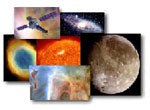 Course content
(see Canvas for weekly updates) Course content
(see Canvas for weekly updates)
- The sky and quick tour of the cosmos (ch.1-2)
- Copernican revolution (ch.3)
- Solar system and its origins (ch.6)
- Meteorites, asteroids, and comets
(ch.9)
- Light and spectroscopy (ch.5)
- HR diagram (ch.11)
- Stellar evolution (ch.12-13)
- Terrestrial worlds (ch.7)
- Life in the Universe (ch.18)
- Other topics (based on student
interest)
Chapters are based on Bennett's The
Essential Cosmic Perspective, 6th ed.
|
 Quick
FAQs (including common gripes and excuses)
Quick
FAQs (including common gripes and excuses)
Whether you have a gripe, an excuse, or a question related to the class, the
answer can probably be found here:
http://people.highline.edu/iglozman/classes/ast100_syl_faqs.htm. (Click
here
to hear what most excuses sound like to someone who has heard it all before.)
***************************************************************************************************************************************
****Note: The rest of the syllabus is for reference only. Please save
trees if you can and access the rest online:
http://people.highline.edu/iglozman****
***************************************************************************************************************************************
Course components (in gory detail)
 Participation:
There is an old saying that "It's
better to be thought a fool than to
open your mouth and remove all doubt."
While this attitude is quite pervasive
among students, it usually constitutes
an impediment to learning in the
classroom.
Class participation is very
important not only for your own success but also for that of your
classmates. So try to become active participants in the learning
community, whether it be the actual
classroom or discussion web. Form study
groups, participate in classroom discussions, and be prepared to answer
questions in the discussion board. Of course,
feel free to ask questions at any time.
Participation:
There is an old saying that "It's
better to be thought a fool than to
open your mouth and remove all doubt."
While this attitude is quite pervasive
among students, it usually constitutes
an impediment to learning in the
classroom.
Class participation is very
important not only for your own success but also for that of your
classmates. So try to become active participants in the learning
community, whether it be the actual
classroom or discussion web. Form study
groups, participate in classroom discussions, and be prepared to answer
questions in the discussion board. Of course,
feel free to ask questions at any time.
- Be active. Try not to vegetate.
- It's not uncool to ask or answer
questions in class.
- The only wrong answer is no answer
("Hmm, I dunnnoooo...").
- Feel free to make suggestions for class
improvement.

 Homework
quizzes:
To help you keep up with class material,
weekly quizzes
have been set up in Canvas. For best
results, you should start working on the
quizzes as soon as they becomes available
and you should make an effort to be as
independent as possible, referring to
the book or other resources when necessary.
Keep in mind that
the real learning is in the journey.
Merely getting the right answer with the
help of a friend or tutor may bypass the
critical learning component. Of course,
you should get help after making a
sincere effort and hitting a dead end.
Homework
quizzes:
To help you keep up with class material,
weekly quizzes
have been set up in Canvas. For best
results, you should start working on the
quizzes as soon as they becomes available
and you should make an effort to be as
independent as possible, referring to
the book or other resources when necessary.
Keep in mind that
the real learning is in the journey.
Merely getting the right answer with the
help of a friend or tutor may bypass the
critical learning component. Of course,
you should get help after making a
sincere effort and hitting a dead end.
- There are no legitimate
excuses for late homework.
 Canvas:
All assignments in this class are
submitted online in
Canvas (http://Canvas.highline.edu). Email should
never be used to submit assignments. You
should log in regularly to participate
and to make sure that you are aware of
all due dates. For help with Canvas,
please visit:
https://its.highline.edu/index.php
Canvas:
All assignments in this class are
submitted online in
Canvas (http://Canvas.highline.edu). Email should
never be used to submit assignments. You
should log in regularly to participate
and to make sure that you are aware of
all due dates. For help with Canvas,
please visit:
https://its.highline.edu/index.php
 ****Midterms and Final:
Exams are your chance to show off what you
have learned. If you do your homework
and stay alert in class, you shouldn't have too much trouble. Because of the wide spectrum
of preparedness on the part of the
students, the distribution of scores on
the exams can also be quite broad. An
average of 50-60% is not unusual in a
science class, with
some students significantly above and
some below. If you need special
accommodations, please let me know in advance.
****Midterms and Final:
Exams are your chance to show off what you
have learned. If you do your homework
and stay alert in class, you shouldn't have too much trouble. Because of the wide spectrum
of preparedness on the part of the
students, the distribution of scores on
the exams can also be quite broad. An
average of 50-60% is not unusual in a
science class, with
some students significantly above and
some below. If you need special
accommodations, please let me know in advance.

 Journal: A journal is a record of
occurrences, experiences, and reflections
kept on a regular basis--a bit like a
diary. Whether in industry or in an educational
setting, making observations and generally
being more self-reflective are helpful in
identifying areas of strength and weakness
so that appropriate adjustments can be
made and better problem-solving algorithms
can be developed. By directing you to be
more self-reflective, a journal can
increase your effectiveness by helping you
define objectives and set goals, and
monitor progress toward them. Secondarily,
this process would
also allow an outside observer (e.g.,
supervisor or teacher) to offer some
useful feedback. In this class, you will
be expected to keep such a journal and
make regular
entries in it, roughly every
couple of days. Entries
can include things you've learned or are
having trouble with, and any other
school-related experiences that may be
affecting your performance. Here are
some guidelines:
Journal: A journal is a record of
occurrences, experiences, and reflections
kept on a regular basis--a bit like a
diary. Whether in industry or in an educational
setting, making observations and generally
being more self-reflective are helpful in
identifying areas of strength and weakness
so that appropriate adjustments can be
made and better problem-solving algorithms
can be developed. By directing you to be
more self-reflective, a journal can
increase your effectiveness by helping you
define objectives and set goals, and
monitor progress toward them. Secondarily,
this process would
also allow an outside observer (e.g.,
supervisor or teacher) to offer some
useful feedback. In this class, you will
be expected to keep such a journal and
make regular
entries in it, roughly every
couple of days. Entries
can include things you've learned or are
having trouble with, and any other
school-related experiences that may be
affecting your performance. Here are
some guidelines:
-
Your first entry should
be some comment on the
syllabus--basically, to leave the
impression that you've looked it over.
-
Your progress and mastery of the
material should be addressed regularly.
-
You should offer thoughtful critique of
the various sections of the textbook.
-
You should report
on your progress with
procrastination (a serious issue for
most students).
-
Sample journal
entry: "I have been so excited
about taking this class, but I'm so
frustrated this week because I've
been sick with such a bad cold that
it's been hard to think and do much
of anything. I don't feel like I've
gotten as involved in the class yet
as I would like to be. I did most of
the first homework and really
enjoyed it. It was kind of like a
learning scavenger hunt."
Grade/Self-Evaluation: The 'Grade'
assignment gives students the
opportunity to argue for the grade
they think you
have earned based on the criteria listed
in this syllabus. This assignment is
required at the end of the course but
students are also encouraged to make at
least one submission early in the course
to get a sense of the grading system and
whenever they wish to estimate their
status in the class. The grade calculator
page,
http://people.highline.edu/iglozman/classes/gradecalc.htm,
includes a rubric and some sample
self-evaluations.
 Forum: One good way to
interact with your classmates without the headache of organizing meetings
is to exchange ideas in the “virtual
forum” or discussion web set up specifically for your class in
Canvas. I encourage you to use
the forum to solve homework problems
together, ask questions, make
suggestions, or simply air some
thoughts. In addition, important
announcements will appear in the forum.
Remember that you are all in this
adventure together, so please do as much
as you can to contribute. Most of you
will find visiting the forum a pleasant
adventure, a way to hang out with
familiar characters. For some, the forum
will turn out to be an addiction--but
fortunately one of the healthy ones.
Note: To get full credit for forum
participation, you need to demonstrate
not only a consistent effort throughout
the quarter but also some depth in at
least a few of your posts. As with the
science articles (see below), it is not
sufficient to unload during the last
couple of weeks.
Forum: One good way to
interact with your classmates without the headache of organizing meetings
is to exchange ideas in the “virtual
forum” or discussion web set up specifically for your class in
Canvas. I encourage you to use
the forum to solve homework problems
together, ask questions, make
suggestions, or simply air some
thoughts. In addition, important
announcements will appear in the forum.
Remember that you are all in this
adventure together, so please do as much
as you can to contribute. Most of you
will find visiting the forum a pleasant
adventure, a way to hang out with
familiar characters. For some, the forum
will turn out to be an addiction--but
fortunately one of the healthy ones.
Note: To get full credit for forum
participation, you need to demonstrate
not only a consistent effort throughout
the quarter but also some depth in at
least a few of your posts. As with the
science articles (see below), it is not
sufficient to unload during the last
couple of weeks.
-
The forum extends the classroom.
-
Make some connections in
the forum.
-
Look for important
announcements in the forum.
 Group
presentation: (Does not apply to online
astronomy.) This is your opportunity to
research a topic of interest to you (but related
to course material) in some depth and educate
your peers (the class), while sharpening your
communication skills. They do say, after all,
that the best way to learn a topic is to teach
it. Powerpoint is the preferred presentation
tool in this class.
You are encouraged to choose a topic of
particular interest to you; some ideas can be
found here:
http://www.people.highline.edu/iglozman/classes/project_ideas.htm. Keep
in mind, however, that it is ultimately
your responsibility to find a topic. You are also encouraged to use any other
props which you feel will enhance your
presentation and stimulate your audience.
A degree in engineering or astrophysics
is not required, but a creative spirit
and an outpouring of enthusiasm wouldn't
hurt. You should work
in groups of 3-5 people, but you must
share the workload.
Group
presentation: (Does not apply to online
astronomy.) This is your opportunity to
research a topic of interest to you (but related
to course material) in some depth and educate
your peers (the class), while sharpening your
communication skills. They do say, after all,
that the best way to learn a topic is to teach
it. Powerpoint is the preferred presentation
tool in this class.
You are encouraged to choose a topic of
particular interest to you; some ideas can be
found here:
http://www.people.highline.edu/iglozman/classes/project_ideas.htm. Keep
in mind, however, that it is ultimately
your responsibility to find a topic. You are also encouraged to use any other
props which you feel will enhance your
presentation and stimulate your audience.
A degree in engineering or astrophysics
is not required, but a creative spirit
and an outpouring of enthusiasm wouldn't
hurt. You should work
in groups of 3-5 people, but you must
share the workload.
- Be creative and enthusiastic.
- Share the workload.
- Learn PowerPoint.
- Useful web sites to collect
sounds, images, animations:
 Science articles:
Science articles:
Read an article on a
science-related topic (any science, not
necessarily astronomy) and post
a short blurb in the
Articles forum. This blurb should be no longer
than a couple of sentences, a quick
summary of the big ideas--just long
enough to whet the reader's appetite.
Include a couple of
interesting questions, with answers,
related to the article, as well as a
reference link.
The Q&A is a good way of presenting
information--an alternative to simply
stating dry facts. Science sources can be found
all over the web, as suggested by (but
not limited to) to this list:
http://people.highline.edu/iglozman/bibliography.htm
Here is a couple
of
examples:
- Article#1: How fast do planets
form?
A new study suggests that planets
may form much faster than once
believed. Using powerful computer
models, it has been estimated that
planets may form in just a few hundred
years, as opposed to millions.Read
about it here:
http://www.space.com/scienceastronomy/planets_quickly_021129.html
Q: How are planets generally
believed to be formed? A: After the formation of the core,
the young planet begins collects
material, 'snowballing' into a larger
planet. It is a slow process, and can
take millions of years.
Q: What's wrong with that? Sounds
good to me! A: Well, beyond Saturn there
doesn't seem like there would be
enough material to form Neptune and
Uranus. Also, it is believed that the
only likely way Jupiter could have
come into being is through a more
rapid formation (this was determined
from the composition of Jupiter's
atmosphere).
Older article here:
http://www.space.com/scienceastronomy/solarsystem/jupiter_elements_991117.html
- Article#1: Bad news for sharks
Due to deep misconception and sheer
stupidity the shark population has
been declining based on the belief
that shark cartilage can cure cancer.
Q: How is it supposed to
work? A: It isn't, people
believe stupid things
Q: Has there been any proof?
A: No, as a result cancer
patients have not been accepting more
reliable forms of treatment.
Q: Is there any hope? A: For us or
the sharks? There may be a possibility
to refine a compound for anti-cancer
purposes from shark, but that has yet
to be done. As for the sharks...they
can only hope we get smarter (for our
sake, as well as theirs).
To learn more about the stupidity
of some people..
http://www.medicalnewstoday.com/medicalnews.php?newsid=17189
- Article#1: Robots with a sense of
touch?
Researchers in Tokyo have developed an
array of pressure sensing transistors
which may be implemented in giving
robots a sense of touch. The “pressure
sensing” comes from a change in
resistance within the array when
pressure is applied to the rubber
sheet in which they are contained.
Q: What is beneficial about a robot
with pressure sensing abilities? A:
Pressure sensing would allow robots to
handle more sensitive/fragile objects,
and may be one step closer to a
human-like robot.
Q: Are there any other possible
applications for transistor arrays
such as this? A: There are many ways
pressure sensing arrays like this can
be implemented. Some examples are
monitoring hospital patients in their
beds with pressure sensing sheets, or
possibly a new variety of home
security systems.
Ref:
http://www.trnmag.com/Stories/2004/092204/Flexible_sensors_make_robot_skin%20_092204.html
- Article#1: "Who
mourns for Hubble?"
Just two days after Bush
announces his plans to send humans
to the Moon and Mars, NASA announces
that the Hubble Space Telescope (HST)
will no longer be serviced. This
means that HST has been effectively
sentenced to death.
Q: How often does HST have to be
serviced: A: That varies with
circumstances (plans, failures,
etc.), but every 2-4 years is
typical. HST was last serviced in
March of 2002 to have one of its
cameras replaced. A couple of new
cameras were to be installed in
2006, but those plans have now been
scrapped.
Q: How long can HST remain in
orbit without being serviced? A:
Failure of one of its critical
components is a random event which
could occur at any time between now
and a few years from now. The most
critical components include
gyroscopes (for maintaining
direction) and batteries (from 1990,
were to be replaced in 2006). Of the
six gyroscopes onboard, two have
already failed and a third is
showing signs of trouble.
Q: Why abandon HST, which has
been so hugely successful? A:
Maintaining HST is quite expensive
and would have involved the
development of new technology in the
wake of the recent Columbia Shuttle
disaster. Its abandonment represents
one of many sacrifices science would
have to make to help pay for the
president's new initiatives. Also,
NASA is committed to building the
James Webb Space Telescope,
considered Hubble's successor and
currently scheduled for launch in
2011.
Q: What can be done to extend
HST’s life without servicing it? A:
As far as preserving battery life as
long as possible, HST could run only
one science instrument at a time,
instead of all of them at once (as
it has in the past).
Q: Wouldn’t HST threaten people
and property on the ground when its
orbit decays and it crashes to
Earth? A: To prevent serious injury
on the ground, NASA plans to develop
a robot which would fly to the
telescope, attach a retrorocket, and
steer the spacecraft to a harmless
reentry over an unpopulated area.
ref:
http://skyandtelescope.com/news/article_1156_1.asp

These articles are intended to
encourage you to practice your written
communication skills, especially as
they relate to scientific material.
Your effort on the articles will
become part of your overall grade on
the presentation. While some students
find it difficult to add yet another
task to their already busy schedules,
the potential benefits suggest that it
might be a good investment. These
include:
- opportunity to improve one's
scientific literacy
- opportunity to get excited about
science and science education
- opportunity to improve one's
ability to present information in a
concise and exciting way (something
that most people find difficult, and
this is particularly evident during
their oral presentations)
- practice in identifying the BIG
PICTURE
- practice with time management
- excuse to interact with peers
Be prepared to respond to questions
that might arise in connection to these
articles. This is all very informal, so
try not to be too stressed about it, but
do put some effort into it. As with
forum participation (see above), consistency is very
important, so try not to unload during
the last week or two. You need to do about 1
article per week (in the forum). More is
better, less is worse. You also need to respond to
at least two articles per week in the
forum. Your response not only keeps
you alert to others' posts, but also
encourages others to keep posting.
(An indifferent audience is not very
motivating.) Keep track of your
activities with regard to articles
and comment on them in the journals.
Stargazing:
Because this is an astronomy class,
students will be expected to become
familiar with the night sky. This is
not only a requirement, but is also
quite fun. At least twice per week,
you will need to post in the
Stargazing forum (in Canvas)
observations you have made of the
evening sky. As with the science
articles, the objective here is not
only to learn, but also to teach. You
can teach us about constellations and
asterisms, relevant mythology and
historical anecdotes, the physical
properties of objects in the sky,
experiences with stargazing software,
and anything else that you think might
be interesting and educational. A
telescope can be helpful for observing
some sky objects (e.g., clusters), but
is certainly not required. By the end
of this class, you should be able to
identify and describe most of the
visible objects in the sky. Here's a typical observation:
 At the moment, the sky is cooperating. So put on your mittens get the hot
chocolate ready and run outside for a quick peek. Betelgeuse (in Orion),
Aldebaran (Taurus), and Mars form a nice triangle. In the neighborhood of
Aldebaran, you should spot a little cluster of stars called
Pleiades. It looks like
a tiny Dipper. With binoculars or better, you should make out 7 or more
bright stars. It's a very famous cluster, quite pretty, and is also the Subaru
logo. Of course, if you see some other sky critters, feel free to
share.
At the moment, the sky is cooperating. So put on your mittens get the hot
chocolate ready and run outside for a quick peek. Betelgeuse (in Orion),
Aldebaran (Taurus), and Mars form a nice triangle. In the neighborhood of
Aldebaran, you should spot a little cluster of stars called
Pleiades. It looks like
a tiny Dipper. With binoculars or better, you should make out 7 or more
bright stars. It's a very famous cluster, quite pretty, and is also the Subaru
logo. Of course, if you see some other sky critters, feel free to
share.
You may find some of the following online
resources helpful:
- Starry Night CD-ROM that comes
with your textbook
From the publisher:
"This best selling planetarium software lets you escape the Milky Way and
travel within 700 million light years of space. View more than 16 million
stars in stunningly realistic star fields. Zoom in on thousand of galaxies,
nebulae, and star clusters. Move through 200,000 years of time to see key
celestial events in a dynamic and ever-changing universe. Blast off from
Earth and see the motions of the planets from a new perspective. Hailed for
its breath taking realism, powerful suite of features, and intuitive
ease-of-use, Starry Night Pro lives up to its reputation as astronomy
software’s brightest …night after night."
-
Sky & Telescope
Sky & Telescope magazine has a wealth of stargazing
information. The website also offers an interactive sky chart which makes
the identification of celestial objects both fun and relatively
straightforward. You'll need to register once (free of charge) and enter
your location either by city, zip code, or by actual coordinates (e.g., 49
deg north latitude, 122 deg west longitude for Seattle). Visit this site
regularly to enhance your stargazing experience and share interesting
observations in the general forum.
- Earth
& Sky
News, daily stargazing tips, and fun podcasts.
-
Stardate Online
"StarDate is the public education and outreach arm of the
University of Texas McDonald
Observatory. Our English and Spanish
radio programs
air daily on more than 500 stations. And our popular bimonthly astronomy
magazine is the perfect
skywatching companion for amateur astronomers or anyone interested in
celestial events and space exploration."
- Various smartphone apps (see Canvas's 'Course Info' for a list of popular
apps).
Keys to success
 The
mindset of success: Do you avoid challenge or embrace it? Are you sensitive
to criticism or do you learn from it? Are you threatened by the success of
others or are you inspired by it? When confronted with something unfamiliar, are
you more afraid of being wrong than excited to learn something new? Which do you
value more, rigid structure or the freedom to explore? The answers to these
questions can help you determine whether you have a Fixed Mindset or a Growth
Mindset. Which mindset do you think correlates more strongly with success and
happiness? This article explores
such questions and may be helpful even beyond school.
The
mindset of success: Do you avoid challenge or embrace it? Are you sensitive
to criticism or do you learn from it? Are you threatened by the success of
others or are you inspired by it? When confronted with something unfamiliar, are
you more afraid of being wrong than excited to learn something new? Which do you
value more, rigid structure or the freedom to explore? The answers to these
questions can help you determine whether you have a Fixed Mindset or a Growth
Mindset. Which mindset do you think correlates more strongly with success and
happiness? This article explores
such questions and may be helpful even beyond school.
 Attitude
and perspective: Although science tends to be challenging for most
nonscience students, the real difficulty is not the subject matter but rather the attitude
with which it is approached. The best approach is to work hard and apply
oneself. In addition, maintain a positive attitude and a
love of learning at all times. Try not whine about how difficult the
material is; instead, try to have fun and be grateful for your educational
opportunities. When you start to feel a little stressed from school, try to
think about the starving orphan in some third-world, poverty-stricken village
who would love to trade places with you. It's all a question of
perspective, so try to maintain a healthy one.
Attitude
and perspective: Although science tends to be challenging for most
nonscience students, the real difficulty is not the subject matter but rather the attitude
with which it is approached. The best approach is to work hard and apply
oneself. In addition, maintain a positive attitude and a
love of learning at all times. Try not whine about how difficult the
material is; instead, try to have fun and be grateful for your educational
opportunities. When you start to feel a little stressed from school, try to
think about the starving orphan in some third-world, poverty-stricken village
who would love to trade places with you. It's all a question of
perspective, so try to maintain a healthy one.
- Maintain a positive attitude.
- Appreciate educational opportunities.
- Learn because it's fun, not because you have to.
- "A pessimist sees the difficulty in every opportunity; an optimist sees
the opportunity in every difficulty."-- More Winston Churchill
 Academic maturity: Academic maturity is an umbrella term used to
describe those characteristics which allow students to reach their academic
potential and achieve growth in an academic environment and ultimately in the
field of their choice. Characteristics generally associated with academic
maturity include:
Academic maturity: Academic maturity is an umbrella term used to
describe those characteristics which allow students to reach their academic
potential and achieve growth in an academic environment and ultimately in the
field of their choice. Characteristics generally associated with academic
maturity include:
- Self-motivated and independent learner.
- Prefers constructive criticism to whining.
- Enthusiasm for learning.
- Perseverance.
- Ability to cope with real-world stressors.
- Ability to meet deadlines with minimal procrastination.
In their book Making Sense of College Grades (Jossey-Bass, 1986),
Ohmer Milton, Howard R. Pollio, and James A. Eison found that learning-oriented
college students were more inclined to explore possibilities and relationships
rather than to work only with known facts; they also were more attentive to
lectures. In contrast, grade-oriented students who focus on "making the
grade"--for example, who only read material that will be tested and view other
class reading as an inconvenient waste of time--performed less well on exams,
had poorer study habits, and were twice as likely to report having cheated
repeatedly. So try to approach your educational opportunities in a mature,
knowledge-hungry way. Remember that only half of your grade will be based on
exams. The other half will be based on academic maturity (in its various forms).
 Deadlines and due
dates: Deadlines and due dates are an integral part of the world we live in.
We all have to deal with them and they help us stay on track. In that regard,
this class is no different: All assignments come with a due date. The due dates
for homework assignments are firm to motivate you to stay on top of the
material and discourage you from procrastinating. A due date should not be
interpreted as the day to work feverishly on an assignment. Instead, you should
be working on assignments with consistency (not in spikes) as soon as they are
available, keeping the due dates in mind as aids in helping you manage your time
and tasks efficiently. Those that have trouble staying on top of due dates might
consider mentally moving the due date up to a somewhat earlier time. Keep in mind that the ability to keep up with the due dates is an important
aspect of each
assignment. If you miss an assignment (for any reason), you should explain your
circumstances in your journal.
Deadlines and due
dates: Deadlines and due dates are an integral part of the world we live in.
We all have to deal with them and they help us stay on track. In that regard,
this class is no different: All assignments come with a due date. The due dates
for homework assignments are firm to motivate you to stay on top of the
material and discourage you from procrastinating. A due date should not be
interpreted as the day to work feverishly on an assignment. Instead, you should
be working on assignments with consistency (not in spikes) as soon as they are
available, keeping the due dates in mind as aids in helping you manage your time
and tasks efficiently. Those that have trouble staying on top of due dates might
consider mentally moving the due date up to a somewhat earlier time. Keep in mind that the ability to keep up with the due dates is an important
aspect of each
assignment. If you miss an assignment (for any reason), you should explain your
circumstances in your journal.
- Study with consistency, not in
spikes.
- Keep up with the due dates.
- Resist the temptation of asking for extensions.
 Independent learning: In this
class, students are expected to
develop the ability to read the book
and to be independent of the
instructor (as much as possible) in
learning the material. The
instructor should be viewed more as
a tour guide and facilitator than a transferrer
of knowledge. So don't be
afraid to learn things on your own.
You are expected to do so--during
this class and during the rest of
your lives. In a lecture class, you should try to
familiarize yourself with the
concepts before seeing them in
class. In an online class, this is
really your only option, so you need
to be even more motivated.
Independent learning: In this
class, students are expected to
develop the ability to read the book
and to be independent of the
instructor (as much as possible) in
learning the material. The
instructor should be viewed more as
a tour guide and facilitator than a transferrer
of knowledge. So don't be
afraid to learn things on your own.
You are expected to do so--during
this class and during the rest of
your lives. In a lecture class, you should try to
familiarize yourself with the
concepts before seeing them in
class. In an online class, this is
really your only option, so you need
to be even more motivated.

 Critical
thinking vs stupid pet tricks: "Critical thinking"
and "thinking outside the box" are
catch phrases which are receiving
increasingly more attention in both
education and in the industrial
world. Traditionally, education of
the masses has emphasized the rote
memorization of facts rather than
depth of understanding. In today's
fast-paced world, however, as
information proliferates and becomes
obsolete more rapidly, the
traditional assembly-line philosophy
of learning can no longer be
considered adequate. Indeed,
information becomes less important
than the ability to access
information, to identify and define
issues or problems, to generate
hypotheses, to construct arguments,
to make inferences, and to evaluate
results. All these new demands
require that students actively
engage in learning rather than
passively "receive" knowledge. So do
your best to become
active learners and try not to
react in a Pavlovian manner
to a few dangling points.
Critical
thinking vs stupid pet tricks: "Critical thinking"
and "thinking outside the box" are
catch phrases which are receiving
increasingly more attention in both
education and in the industrial
world. Traditionally, education of
the masses has emphasized the rote
memorization of facts rather than
depth of understanding. In today's
fast-paced world, however, as
information proliferates and becomes
obsolete more rapidly, the
traditional assembly-line philosophy
of learning can no longer be
considered adequate. Indeed,
information becomes less important
than the ability to access
information, to identify and define
issues or problems, to generate
hypotheses, to construct arguments,
to make inferences, and to evaluate
results. All these new demands
require that students actively
engage in learning rather than
passively "receive" knowledge. So do
your best to become
active learners and try not to
react in a Pavlovian manner
to a few dangling points.
- Think outside the box.
- Be a creative thinker.
- Recognize the difference
between critical thinking and
stupid pet tricks.
- Be proactive in your
learning.
 Understanding vs memorization:
Astronomy, like any other branch of
science, deals with quantitative as
well as qualitative concepts. The
quantitative aspects of astronomy
generally involve the categorization
of a seemingly vast amount of
information into a few relatively
simple principles. You will
find that if you invest some time into
understanding these principles and
the qualitative concepts behind them,
you will not only gain a deeper and
longer-lasting understanding of
astronomy and the scientific method,
but you will also avoid the all too
common and painful mistake of trying to memorize
a gazillion factoids. For your
continued edification, the "internalize
but do not memorize" mantra will be
chanted repeatedly throughout the
course.
Understanding vs memorization:
Astronomy, like any other branch of
science, deals with quantitative as
well as qualitative concepts. The
quantitative aspects of astronomy
generally involve the categorization
of a seemingly vast amount of
information into a few relatively
simple principles. You will
find that if you invest some time into
understanding these principles and
the qualitative concepts behind them,
you will not only gain a deeper and
longer-lasting understanding of
astronomy and the scientific method,
but you will also avoid the all too
common and painful mistake of trying to memorize
a gazillion factoids. For your
continued edification, the "internalize
but do not memorize" mantra will be
chanted repeatedly throughout the
course.
- Look for and try to understand
patterns and basic principles.
- Don't stuff your head with
forgettable factoids.
- Internalize but do NOT memorize.
- Recognize the difference
between critical thinking and
stupid pet tricks.

 ***Computer
literacy: Computers are a
general-purpose tool; they may appeal
to different people in different ways.
One person may like graphics and
animation. Another may like electronic
mail. Another may prefer video games.
Whatever one's particular uses of a
computer, proficiency with a computer
can dramatically increase one's productivity
and potential for success.
Unfortunately, not everyone is
completely comfortable with the use of
computers, and some even suffer from
computer phobia. Fortunately, like all
irrational fears, computer phobia is no
match for a determined, curiosity-driven
mind and gradually dissolves with
practice and perseverance.
***Computer
literacy: Computers are a
general-purpose tool; they may appeal
to different people in different ways.
One person may like graphics and
animation. Another may like electronic
mail. Another may prefer video games.
Whatever one's particular uses of a
computer, proficiency with a computer
can dramatically increase one's productivity
and potential for success.
Unfortunately, not everyone is
completely comfortable with the use of
computers, and some even suffer from
computer phobia. Fortunately, like all
irrational fears, computer phobia is no
match for a determined, curiosity-driven
mind and gradually dissolves with
practice and perseverance.
As with most new things, there is a
learning curve, and feeling some
frustration at times is perfectly
natural. The important thing to realize
is that learning to use computer
technology (in its many incarnations) is
not something that should be considered
a distraction from class work; it IS a
big part of the class. Irrespective of
background, all students in the class
will be expected to master the following
list of computer-related skills:
- Getting and submitting assignments
online
- Using email and a discussion web
to communicate with instructor and
classmates
- Surfing the web for research and
for fun
Pedagogy
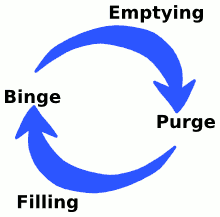 A
paradigm shift: According to
William Perry's
Scheme of Intellectual Development,
the typical first-year college
student has a dualistic view of
knowledge, believing that right
answers for everything exist in the
absolute and that the role of the
instructor is to teach them.
Knowledge represents a gradual
accretion of right answers acquired
through effort and obedience to the
instructor. Sadly, traditional
teaching practices, particularly in
introductory courses, tend to
reinforce, rather than challenge,
this unsophisticated view of
learning. Traditional approaches
emphasize the presentation of
information, and define learning as
its absorption. In contrast to this
traditional content-driven paradigm,
an effective student-centered,
learning-oriented classroom involves
a more active approach to learning,
characterized by the following basic
principles:
A
paradigm shift: According to
William Perry's
Scheme of Intellectual Development,
the typical first-year college
student has a dualistic view of
knowledge, believing that right
answers for everything exist in the
absolute and that the role of the
instructor is to teach them.
Knowledge represents a gradual
accretion of right answers acquired
through effort and obedience to the
instructor. Sadly, traditional
teaching practices, particularly in
introductory courses, tend to
reinforce, rather than challenge,
this unsophisticated view of
learning. Traditional approaches
emphasize the presentation of
information, and define learning as
its absorption. In contrast to this
traditional content-driven paradigm,
an effective student-centered,
learning-oriented classroom involves
a more active approach to learning,
characterized by the following basic
principles:
- Teaching excellence does
not necessarily equal sound
academic knowledge, extensive
content coverage, and polished
presentation skills.
- Excellence in learning does
not necessarily equal the
flawless recall and summary of
information.
- Rather than the strict
coverage of content, the goal of
instruction centers on the
intellectual development of
students.
- The learner's brain is no
longer considered a vessel to be
filled by the expertise of the
instructor.
- Students learn to think
independently while the
instructor facilitates the
process.
- Students learn to judge the
merits of ideas, information,
and values based on certain
criteria ("knowledge is
context-dependent").
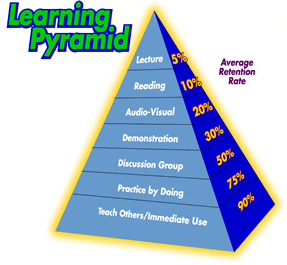
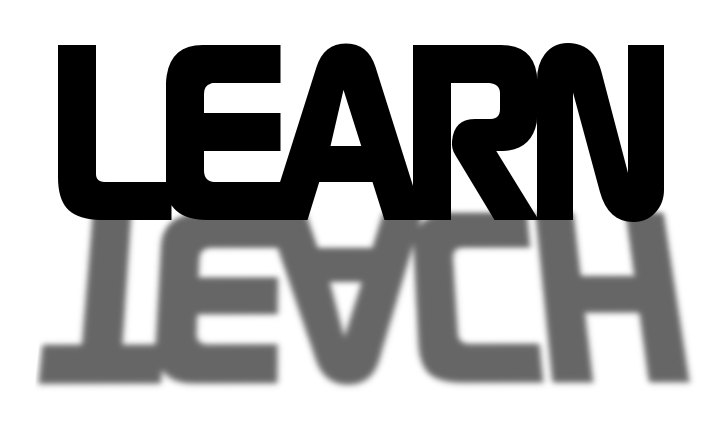 Active
vs passive: ***In the
traditional model of education, the
instructor is expected to have all
the answers, while the student is
expected to listen, take notes, and
then demonstrate how full of
knowledge he/she has become (usually
on a test). In this model, brains
are essentially treated as passive
receptacles to be filled by the
expertise of the instructor. And while most
educational experts today recognize
that this is not an effective mode
of teaching (as this
learning pyramid illustrates), it is still
unfortunately the predominant mode
of education at the undergraduate
levels. Hopefully, we can do a
little better in this class. In
particular, students in this class
will be expected to be active
participants in the learning
community, teaching themselves as
well as others, being proactive
instead of reactive. While this is
not always most comfortable for many
students, it does appear to be the
best way to learn, which is the
objective in this class.
Active
vs passive: ***In the
traditional model of education, the
instructor is expected to have all
the answers, while the student is
expected to listen, take notes, and
then demonstrate how full of
knowledge he/she has become (usually
on a test). In this model, brains
are essentially treated as passive
receptacles to be filled by the
expertise of the instructor. And while most
educational experts today recognize
that this is not an effective mode
of teaching (as this
learning pyramid illustrates), it is still
unfortunately the predominant mode
of education at the undergraduate
levels. Hopefully, we can do a
little better in this class. In
particular, students in this class
will be expected to be active
participants in the learning
community, teaching themselves as
well as others, being proactive
instead of reactive. While this is
not always most comfortable for many
students, it does appear to be the
best way to learn, which is the
objective in this class.
If you want to build a ship,
don't drum up the men to gather
wood, divide the work, and give
orders. Instead, teach them to yearn
for the vast and endless sea.—Antoine de Saint-Exupéry
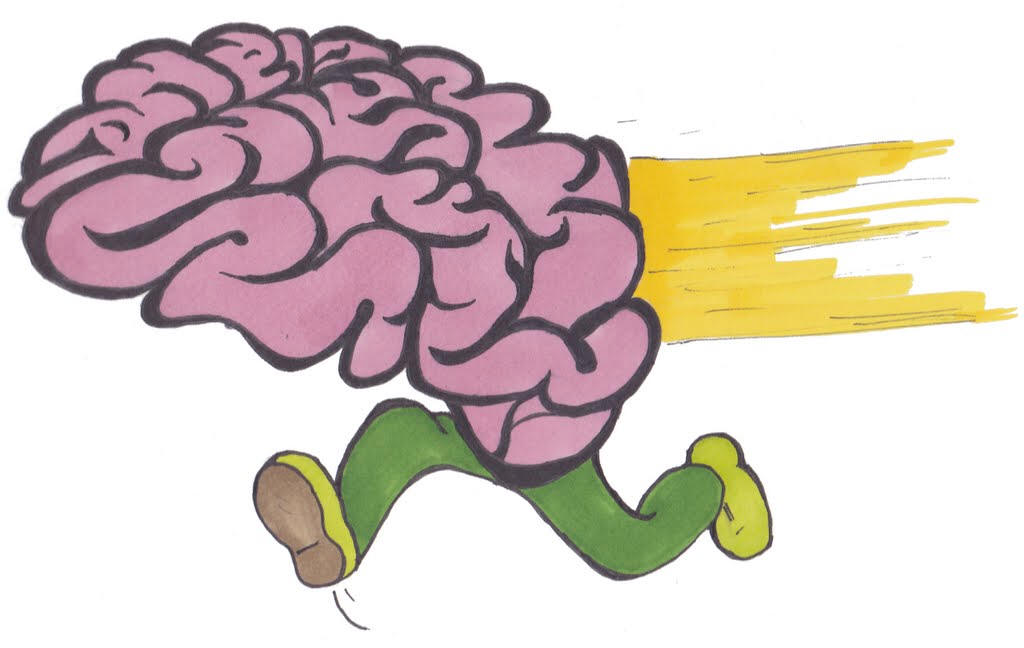
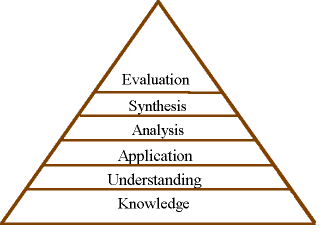
Bloom's
Taxonomy: Much of the philosophy
behind the various class activities
and components is based on
Bloom's Taxonomy of the Cognitive
Domain, a learning theory
based on six levels of intellectual
behaviors: knowledge, comprehension,
application, analysis, synthesis,
and evaluation. These levels
progress from the simplest,
knowledge (the remembering,
either by recognition or recall, of
ideas, materials, and phenomena) to
the most complex, evaluation
(the making of judgments about the
value, for some purpose, of ideas,
works, solutions, methods, material,
etc..).
- The brain should not
be regarded as a passive
receptacle of knowledge.
- "The purpose of education is
to change the thoughts, feelings
and actions of students." -
Benjamin Bloom (1913 - 1999)
 Learning styles: Have
you ever wondered why you loved history
while your friends hated it, felt
inspired by one particular faculty
member while your friends thought she
was boring? Have you ever been
uncomfortable at a party while others
seem to be having a wonderful time? Do
you ever wonder why some people miss
deadlines and never seem to have things
organized while others are always on
time with the precision of a Swiss
watch? All of these are connected to
our personality type and our preferred
way of doing and viewing things. When we
are in a classroom environment that
matches our learning style, everything
feels right. The teacher is stimulating,
the material exciting, the work
enjoyable. But if the environment does
not match our preferred learning style,
we feel out of place, uncomfortable, and
unable to do our best. There are no
right or wrong, good or bad learning
styles, just preferred styles.
Understanding learning styles and
personality preferences provides an
important dimension of self-discovery
and personal growth for students.
Knowing what we have in common with
others, how we differ, and what is
unique about ourselves can be both
empowering and critical to our success
in college and beyond. One of the most
popular rubrics for understanding
personality types is the Myers-Briggs
Type Indicator (MBTI). What's your MBTI?
Find out here:
http://www.gsu.edu/~dschjb/wwwmbti.html.
Learning styles: Have
you ever wondered why you loved history
while your friends hated it, felt
inspired by one particular faculty
member while your friends thought she
was boring? Have you ever been
uncomfortable at a party while others
seem to be having a wonderful time? Do
you ever wonder why some people miss
deadlines and never seem to have things
organized while others are always on
time with the precision of a Swiss
watch? All of these are connected to
our personality type and our preferred
way of doing and viewing things. When we
are in a classroom environment that
matches our learning style, everything
feels right. The teacher is stimulating,
the material exciting, the work
enjoyable. But if the environment does
not match our preferred learning style,
we feel out of place, uncomfortable, and
unable to do our best. There are no
right or wrong, good or bad learning
styles, just preferred styles.
Understanding learning styles and
personality preferences provides an
important dimension of self-discovery
and personal growth for students.
Knowing what we have in common with
others, how we differ, and what is
unique about ourselves can be both
empowering and critical to our success
in college and beyond. One of the most
popular rubrics for understanding
personality types is the Myers-Briggs
Type Indicator (MBTI). What's your MBTI?
Find out here:
http://www.gsu.edu/~dschjb/wwwmbti.html.

 Cooperative
learning: A learning community is a group of people all connected by a
common educational or developmental goal. Extensive educational research indicates that when students
learn together in pairs or in small groups, the learning is faster, there is
greater retention, and students feel more positive about the learning process.
The value of cooperative learning has resulted in its widespread use throughout
the country, and it has become a standard part of most curricula.
One common technique in traditional class settings is for a teacher/facilitator
to assign people into groups, which then engage in some classroom activity and
report their results to the greater learning community. The activity may be the
discussion of some hot topic, a lab, a PowerPoint presentation, etc. Many
e-learning environments replicate this sort of activity and framework, utilizing
environments like Canvas to
manage and facilitate the students' interactions. When
working on group projects, all group members must participate in all aspects of
the project, not simply taking turns. While we can all come up with pretty
creative excuses why it's difficult to meet as a group outside of class or how
the discussion board takes too much time, the
ability to collaborate is an important objective of the class (and in the real world),
no less important than the scores on an exam. So, for the benefit of all, please
contribute to the learning community.
Cooperative
learning: A learning community is a group of people all connected by a
common educational or developmental goal. Extensive educational research indicates that when students
learn together in pairs or in small groups, the learning is faster, there is
greater retention, and students feel more positive about the learning process.
The value of cooperative learning has resulted in its widespread use throughout
the country, and it has become a standard part of most curricula.
One common technique in traditional class settings is for a teacher/facilitator
to assign people into groups, which then engage in some classroom activity and
report their results to the greater learning community. The activity may be the
discussion of some hot topic, a lab, a PowerPoint presentation, etc. Many
e-learning environments replicate this sort of activity and framework, utilizing
environments like Canvas to
manage and facilitate the students' interactions. When
working on group projects, all group members must participate in all aspects of
the project, not simply taking turns. While we can all come up with pretty
creative excuses why it's difficult to meet as a group outside of class or how
the discussion board takes too much time, the
ability to collaborate is an important objective of the class (and in the real world),
no less important than the scores on an exam. So, for the benefit of all, please
contribute to the learning community.




 Grading scale
Grading scale Course content
(see Canvas for weekly updates)
Course content
(see Canvas for weekly updates) Quick
FAQs (including common gripes and excuses)
Quick
FAQs (including common gripes and excuses)


 Homework
quizzes:
To help you keep up with class material,
weekly quizzes
have been set up in Canvas. For best
results, you should start working on the
quizzes as soon as they becomes available
and you should make an effort to be as
independent as possible, referring to
the book or other resources when necessary.
Keep in mind that
the real learning is in the journey.
Merely getting the right answer with the
help of a friend or tutor may bypass the
critical learning component. Of course,
you should get help after making a
sincere effort and hitting a dead end.
Homework
quizzes:
To help you keep up with class material,
weekly quizzes
have been set up in Canvas. For best
results, you should start working on the
quizzes as soon as they becomes available
and you should make an effort to be as
independent as possible, referring to
the book or other resources when necessary.
Keep in mind that
the real learning is in the journey.
Merely getting the right answer with the
help of a friend or tutor may bypass the
critical learning component. Of course,
you should get help after making a
sincere effort and hitting a dead end. Canvas:
All assignments in this class are
submitted online in
Canvas (
Canvas:
All assignments in this class are
submitted online in
Canvas (


 Forum: One good way to
interact with your classmates without the headache of organizing meetings
is to exchange ideas in the “virtual
forum” or discussion web set up specifically for your class in
Canvas. I encourage you to use
the forum to solve homework problems
together, ask questions, make
suggestions, or simply air some
thoughts. In addition, important
announcements will appear in the forum.
Remember that you are all in this
adventure together, so please do as much
as you can to contribute. Most of you
will find visiting the forum a pleasant
adventure, a way to hang out with
familiar characters. For some, the forum
will turn out to be an addiction--but
fortunately one of the healthy ones.
Note: To get full credit for forum
participation, you need to demonstrate
not only a consistent effort throughout
the quarter but also some depth in at
least a few of your posts. As with the
science articles (see below), it is not
sufficient to unload during the last
couple of weeks.
Forum: One good way to
interact with your classmates without the headache of organizing meetings
is to exchange ideas in the “virtual
forum” or discussion web set up specifically for your class in
Canvas. I encourage you to use
the forum to solve homework problems
together, ask questions, make
suggestions, or simply air some
thoughts. In addition, important
announcements will appear in the forum.
Remember that you are all in this
adventure together, so please do as much
as you can to contribute. Most of you
will find visiting the forum a pleasant
adventure, a way to hang out with
familiar characters. For some, the forum
will turn out to be an addiction--but
fortunately one of the healthy ones.
Note: To get full credit for forum
participation, you need to demonstrate
not only a consistent effort throughout
the quarter but also some depth in at
least a few of your posts. As with the
science articles (see below), it is not
sufficient to unload during the last
couple of weeks.
 Science articles:
Science articles:

 At the moment, the sky is cooperating. So put on your mittens get the hot
chocolate ready and run outside for a quick peek. Betelgeuse (in Orion),
Aldebaran (Taurus), and Mars form a nice triangle. In the neighborhood of
Aldebaran, you should spot a little cluster of stars called
At the moment, the sky is cooperating. So put on your mittens get the hot
chocolate ready and run outside for a quick peek. Betelgeuse (in Orion),
Aldebaran (Taurus), and Mars form a nice triangle. In the neighborhood of
Aldebaran, you should spot a little cluster of stars called
 The
mindset of success: Do you avoid challenge or embrace it? Are you sensitive
to criticism or do you learn from it? Are you threatened by the success of
others or are you inspired by it? When confronted with something unfamiliar, are
you more afraid of being wrong than excited to learn something new? Which do you
value more, rigid structure or the freedom to explore? The answers to these
questions can help you determine whether you have a Fixed Mindset or a Growth
Mindset. Which mindset do you think correlates more strongly with success and
happiness? This
The
mindset of success: Do you avoid challenge or embrace it? Are you sensitive
to criticism or do you learn from it? Are you threatened by the success of
others or are you inspired by it? When confronted with something unfamiliar, are
you more afraid of being wrong than excited to learn something new? Which do you
value more, rigid structure or the freedom to explore? The answers to these
questions can help you determine whether you have a Fixed Mindset or a Growth
Mindset. Which mindset do you think correlates more strongly with success and
happiness? This  Attitude
and perspective: Although science tends to be challenging for most
nonscience students, the real difficulty is not the subject matter but rather the attitude
with which it is approached. The best approach is to work hard and apply
oneself. In addition, maintain a positive attitude and a
Attitude
and perspective: Although science tends to be challenging for most
nonscience students, the real difficulty is not the subject matter but rather the attitude
with which it is approached. The best approach is to work hard and apply
oneself. In addition, maintain a positive attitude and a

 Deadlines and due
dates: Deadlines and due dates are an integral part of the world we live in.
We all have to deal with them and they help us stay on track. In that regard,
this class is no different: All assignments come with a due date. The due dates
for homework assignments are firm to motivate you to stay on top of the
material and discourage you from procrastinating. A due date should not be
interpreted as the day to work feverishly on an assignment. Instead, you should
be working on assignments with consistency (not in spikes) as soon as they are
available, keeping the due dates in mind as aids in helping you manage your time
and tasks efficiently. Those that have trouble staying on top of due dates might
consider mentally moving the due date up to a somewhat earlier time. Keep in mind that the ability to keep up with the due dates is an important
aspect of each
assignment. If you miss an assignment (for any reason), you should explain your
circumstances in your journal.
Deadlines and due
dates: Deadlines and due dates are an integral part of the world we live in.
We all have to deal with them and they help us stay on track. In that regard,
this class is no different: All assignments come with a due date. The due dates
for homework assignments are firm to motivate you to stay on top of the
material and discourage you from procrastinating. A due date should not be
interpreted as the day to work feverishly on an assignment. Instead, you should
be working on assignments with consistency (not in spikes) as soon as they are
available, keeping the due dates in mind as aids in helping you manage your time
and tasks efficiently. Those that have trouble staying on top of due dates might
consider mentally moving the due date up to a somewhat earlier time. Keep in mind that the ability to keep up with the due dates is an important
aspect of each
assignment. If you miss an assignment (for any reason), you should explain your
circumstances in your journal. Independent learning: In this
class, students are expected to
develop the ability to read the book
and to be independent of the
instructor (as much as possible) in
learning the material. The
instructor should be viewed more as
a tour guide and facilitator than a transferrer
of knowledge. So don't be
afraid to learn things on your own.
You are expected to do so--during
this class and during the rest of
your lives. In a lecture class, you should try to
familiarize yourself with the
concepts before seeing them in
class. In an online class, this is
really your only option, so you need
to be even more motivated.
Independent learning: In this
class, students are expected to
develop the ability to read the book
and to be independent of the
instructor (as much as possible) in
learning the material. The
instructor should be viewed more as
a tour guide and facilitator than a transferrer
of knowledge. So don't be
afraid to learn things on your own.
You are expected to do so--during
this class and during the rest of
your lives. In a lecture class, you should try to
familiarize yourself with the
concepts before seeing them in
class. In an online class, this is
really your only option, so you need
to be even more motivated.
 Critical
thinking vs stupid pet tricks: "Critical thinking"
and "thinking outside the box" are
catch phrases which are receiving
increasingly more attention in both
education and in the industrial
world. Traditionally, education of
the masses has emphasized the rote
memorization of facts rather than
depth of understanding. In today's
fast-paced world, however, as
information proliferates and becomes
obsolete more rapidly, the
traditional assembly-line philosophy
of learning can no longer be
considered adequate. Indeed,
information becomes less important
than the ability to access
information, to identify and define
issues or problems, to generate
hypotheses, to construct arguments,
to make inferences, and to evaluate
results. All these new demands
require that students actively
engage in learning rather than
passively "receive" knowledge. So do
your best to become
active learners and try not to
react in a Pavlovian manner
to a few dangling points.
Critical
thinking vs stupid pet tricks: "Critical thinking"
and "thinking outside the box" are
catch phrases which are receiving
increasingly more attention in both
education and in the industrial
world. Traditionally, education of
the masses has emphasized the rote
memorization of facts rather than
depth of understanding. In today's
fast-paced world, however, as
information proliferates and becomes
obsolete more rapidly, the
traditional assembly-line philosophy
of learning can no longer be
considered adequate. Indeed,
information becomes less important
than the ability to access
information, to identify and define
issues or problems, to generate
hypotheses, to construct arguments,
to make inferences, and to evaluate
results. All these new demands
require that students actively
engage in learning rather than
passively "receive" knowledge. So do
your best to become
active learners and try not to
react in a Pavlovian manner
to a few dangling points. Understanding vs memorization:
Astronomy, like any other branch of
science, deals with quantitative as
well as qualitative concepts. The
quantitative aspects of astronomy
generally involve the categorization
of a seemingly vast amount of
information into a few relatively
simple principles. You will
find that if you invest some time into
understanding these principles and
the qualitative concepts behind them,
you will not only gain a deeper and
longer-lasting understanding of
astronomy and the scientific method,
but you will also avoid the all too
common and painful mistake of trying to memorize
a gazillion factoids. For your
continued edification, the "internalize
but do not memorize" mantra will be
chanted repeatedly throughout the
course.
Understanding vs memorization:
Astronomy, like any other branch of
science, deals with quantitative as
well as qualitative concepts. The
quantitative aspects of astronomy
generally involve the categorization
of a seemingly vast amount of
information into a few relatively
simple principles. You will
find that if you invest some time into
understanding these principles and
the qualitative concepts behind them,
you will not only gain a deeper and
longer-lasting understanding of
astronomy and the scientific method,
but you will also avoid the all too
common and painful mistake of trying to memorize
a gazillion factoids. For your
continued edification, the "internalize
but do not memorize" mantra will be
chanted repeatedly throughout the
course.

 A
paradigm shift: According to
William Perry's
A
paradigm shift: According to
William Perry's

 Active
vs passive: ***In the
traditional model of education, the
instructor is expected to have all
the answers, while the student is
expected to listen, take notes, and
then demonstrate how full of
knowledge he/she has become (usually
on a test). In this model, brains
are essentially treated as passive
receptacles to be filled by the
expertise of the instructor. And while most
educational experts today recognize
that this is not an effective mode
of teaching (as this
Active
vs passive: ***In the
traditional model of education, the
instructor is expected to have all
the answers, while the student is
expected to listen, take notes, and
then demonstrate how full of
knowledge he/she has become (usually
on a test). In this model, brains
are essentially treated as passive
receptacles to be filled by the
expertise of the instructor. And while most
educational experts today recognize
that this is not an effective mode
of teaching (as this


 Learning styles: Have
you ever wondered why you loved history
while your friends hated it, felt
inspired by one particular faculty
member while your friends thought she
was boring? Have you ever been
uncomfortable at a party while others
seem to be having a wonderful time? Do
you ever wonder why some people miss
deadlines and never seem to have things
organized while others are always on
time with the precision of a Swiss
watch? All of these are connected to
our personality type and our preferred
way of doing and viewing things. When we
are in a classroom environment that
matches our learning style, everything
feels right. The teacher is stimulating,
the material exciting, the work
enjoyable. But if the environment does
not match our preferred learning style,
we feel out of place, uncomfortable, and
unable to do our best. There are no
right or wrong, good or bad learning
styles, just preferred styles.
Understanding learning styles and
personality preferences provides an
important dimension of self-discovery
and personal growth for students.
Knowing what we have in common with
others, how we differ, and what is
unique about ourselves can be both
empowering and critical to our success
in college and beyond. One of the most
popular rubrics for understanding
personality types is the Myers-Briggs
Type Indicator (MBTI). What's your MBTI?
Find out here:
Learning styles: Have
you ever wondered why you loved history
while your friends hated it, felt
inspired by one particular faculty
member while your friends thought she
was boring? Have you ever been
uncomfortable at a party while others
seem to be having a wonderful time? Do
you ever wonder why some people miss
deadlines and never seem to have things
organized while others are always on
time with the precision of a Swiss
watch? All of these are connected to
our personality type and our preferred
way of doing and viewing things. When we
are in a classroom environment that
matches our learning style, everything
feels right. The teacher is stimulating,
the material exciting, the work
enjoyable. But if the environment does
not match our preferred learning style,
we feel out of place, uncomfortable, and
unable to do our best. There are no
right or wrong, good or bad learning
styles, just preferred styles.
Understanding learning styles and
personality preferences provides an
important dimension of self-discovery
and personal growth for students.
Knowing what we have in common with
others, how we differ, and what is
unique about ourselves can be both
empowering and critical to our success
in college and beyond. One of the most
popular rubrics for understanding
personality types is the Myers-Briggs
Type Indicator (MBTI). What's your MBTI?
Find out here:


